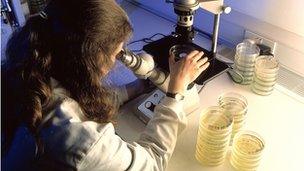University research funds should 'target strengths', Welsh government says
- Published

The report highlights economic benefits from research projects in Cardiff, Swansea and Bangor
The Welsh government has welcomed a report claiming universities in Wales are "punching above their weight" in delivering quality research, but stressed the need to target resources.
The Learned Society of Wales said their report should address "negative perceptions" that Welsh colleges were "seriously underperforming".
But the Welsh government has called for a focus on areas of strength.
Last year it set up a £50m fund to try to encourage top professors to Wales.
gThe Ser Cymru [Stars Wales] strategy, external said "a sound and vibrant scientific and technological base has substantial potential to boost the economy, through advanced ideas, skills and developments and an effective translation through innovation to more high quality jobs".
But a report carried out for the Learned Society of Wales, external, which promotes higher education achievements, claims Welsh universities are performing better than expected given the level of funding.
It looked at the proportion of the UK's quality-related (QR) funding Wales received against the proportion of highest quality - 3* and 4* - research it produced, as measured in a 2008 research assessment exercise (RAE).
The report says that Welsh institutions received 4.3% of QR funding in 2007-08, creating 4.45% of highest quality research, the best result per pound of funding of the four UK nations.
Economic development
The report by Prof Robin Williams, former vice-chancellor of Swansea University, said: "It could be argued that in terms of efficiency, Wales leads the UK in terms of output quality...per pound invested - quite an accolade given that the UK is the international leader in the efficiency of research spending."
But he added that more work could still be done, highlighting the Welsh government's new science policy and additional funding from its Ser Cymru programme to help higher education institutions to improve "help science thrive" to boost the economy.
Prof Williams' study also looked at how universities have been "harvesting the fruits" of research for the benefit of the local community and wider economy.
It claimed that in relation to the UK as a whole a survey by the Higher Education Funding Council for England, external of business links showed that "Wales punches above its weight in most areas", including research funding, software licences generated and research-related start-up companies surviving more than three years.
And it highlights ongoing research and business projects such as Fusion in Cardiff, external, the Institute of Life Science and the Innovation Campus in Swansea, external, as well as the new Pontio arts and science project at Bangor University, external.
The report goes on to say it expects their work will "continue to contribute significantly to economic development".
In a foreword to the report, society president Sir John Cadogan said he hoped the findings would counter "unfortunate and damaging" criticism about the research performance of Welsh universities.
Areas of strength
A Welsh government spokesperson said: "We welcome the report from the Learned Society.
"We know that many of our HE [higher education] institutions boast examples of outstanding research, and we want to see Welsh universities recognised as leaders in their fields not only in the UK but across the globe.
"In order for this to happen, Wales needs to enhance its performance in winning external, competitive research or research and development funding.
"Resources must be targeted on our areas of research strength where we can compete with the best, with fewer, larger research groups and more strategic partnerships."
The spokesperson pointed to the £50m Ser Cymru project to attract academic talent from across the world.
Education Minister Leighton Andrews has also been encouraging Welsh universities to merge, saying he wants to see fewer, stronger institutions able to compete with universities in other parts of the UK.
- Published11 January 2013
- Published5 December 2011
- Published12 March 2012
- Published13 July 2011